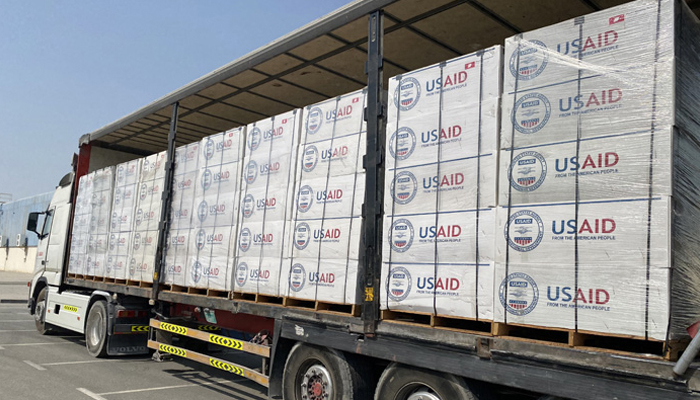USAID delivers LHW kits, MNCH packages
Islamabad:The United States Agency for International Development (USAID) has handed over 5,000 lady health worker kits, 90 maternal, neonatal, and child health packages, and 120 birthing stations to Pakistani authorities to improve health services in eleven flood-affected districts of the Sindh and Balochistan provinces.
The supplies, which are part of USAID’s $27.8 million investment in the health sector’s flood response, will enable lady health workers and health facilities to provide better health services to more than 80,000 children and 100,000 married women of reproductive age, according to USAID Mission Director Kate Somvongsiri. She emphasised the long-term impact of that assistance.
“The donation of $2.3 million in equipment marks a significant investment in strengthening the health resilience of flood-affected communities in Sindh and Balochistan,” she told the ceremony. The June 2022 devastating floods severely disrupted health services in Sindh and Balochistan, affecting over 13 million people and exposing them to waterborne and vector-borne diseases.
The crisis worsened issues in routine immunisation, maternal health, and child malnutrition. Ms Kate Somvongsiri said in response, USAID and its partners assessed health commodity needs in the hardest-hit districts and identified critical shortages. "The commodities delivered during the handover reflect the needs of these communities and align with national priorities," she said.
The USAID mission director said her organisation's intervention went beyond merely supplying equipment; it represented a lifeline for communities struggling to rebuild. She said the provision of lady health worker kits and the establishment of birthing stations, equipped with essential medical tools such as delivery tables, infant warmers, and vital sign monitors, stood as a testament to that commitment.
-
 AI Rivalry: Anthropic Investors Push To De-escalate Pentagon Clash Over AI Safeguards, Sources Say
AI Rivalry: Anthropic Investors Push To De-escalate Pentagon Clash Over AI Safeguards, Sources Say -
 Jamie Lee Curtis Doubles Down On Her Assertion About 'The Bear's Imminent End
Jamie Lee Curtis Doubles Down On Her Assertion About 'The Bear's Imminent End -
 Nicole Kidman Reacts To Daughters' Possible Future In Hollywood
Nicole Kidman Reacts To Daughters' Possible Future In Hollywood -
 Harry Styles Weighs In On The Origins Of His Muse While Talking About 'Carla’s Song' From Upcoming Album
Harry Styles Weighs In On The Origins Of His Muse While Talking About 'Carla’s Song' From Upcoming Album -
 Alarming: New Research Suggests Global Sea Levels Have Been Underestimated Due To Flawed Modelling
Alarming: New Research Suggests Global Sea Levels Have Been Underestimated Due To Flawed Modelling -
 Meghan Markle Elated As ‘As Ever’ Proves To Be ‘double Edged Sword’
Meghan Markle Elated As ‘As Ever’ Proves To Be ‘double Edged Sword’ -
 Gulf Shipping Crisis Deepens Amid Geopolitical Tensions: Can Global Powers Manage Oil Supply Shortfall?
Gulf Shipping Crisis Deepens Amid Geopolitical Tensions: Can Global Powers Manage Oil Supply Shortfall? -
 Nicole Kidman Suffers From An Alarming Condition As She Experiences Emotional Fallout Amid Keith Urban Split
Nicole Kidman Suffers From An Alarming Condition As She Experiences Emotional Fallout Amid Keith Urban Split -
 Tom Brady's Friends Warn Him About Alix Earle's Real Intentions Following Romance Rumors
Tom Brady's Friends Warn Him About Alix Earle's Real Intentions Following Romance Rumors -
 Khloe Kardashian Shares Update On ‘Daddy’ Back Tattoo Removal
Khloe Kardashian Shares Update On ‘Daddy’ Back Tattoo Removal -
 Fortnite Returns To Google Play Worldwide After Google, Epic Games Settle Dispute
Fortnite Returns To Google Play Worldwide After Google, Epic Games Settle Dispute -
 Demi Lovato Reflects On Being Compared To Miley Cyrus, Selena Gomez During Disney Days
Demi Lovato Reflects On Being Compared To Miley Cyrus, Selena Gomez During Disney Days -
 Prince William Envision More ‘accountability’ When He Makes King
Prince William Envision More ‘accountability’ When He Makes King -
 Brad Pitt Eager To Win Fight Over Daughter Shiloh As His War Against Angelina Jolie's Influence On Kids Continues
Brad Pitt Eager To Win Fight Over Daughter Shiloh As His War Against Angelina Jolie's Influence On Kids Continues -
 Teddi Mellencamp Shares Worrisome Update Amid Stage 4 Cancer Battle: 'I Thought I Had Flu'
Teddi Mellencamp Shares Worrisome Update Amid Stage 4 Cancer Battle: 'I Thought I Had Flu' -
 US, UK Split On Crypto Collaboration: Can Bitcoin Help Secure A New Deal?
US, UK Split On Crypto Collaboration: Can Bitcoin Help Secure A New Deal?




